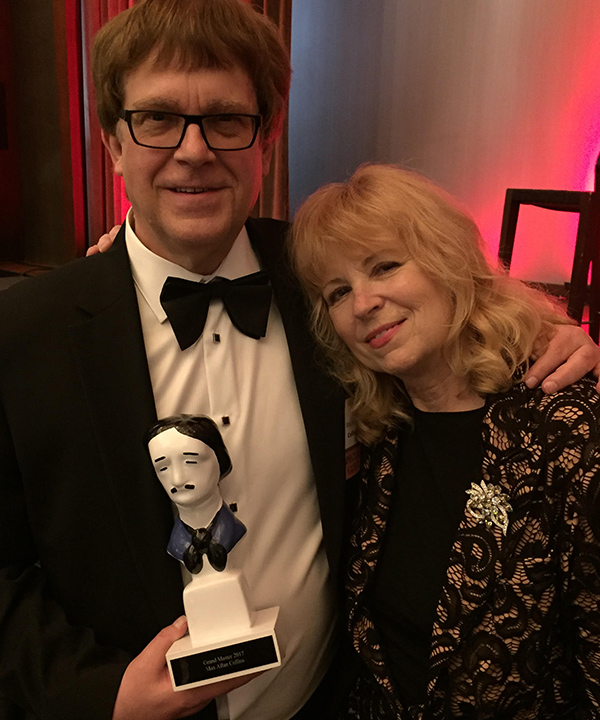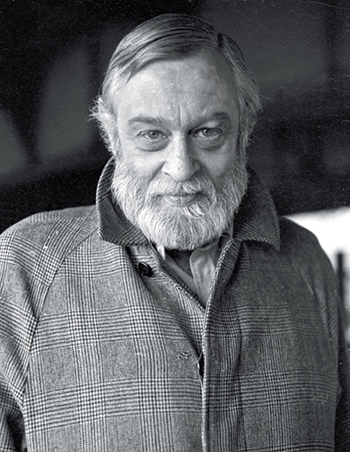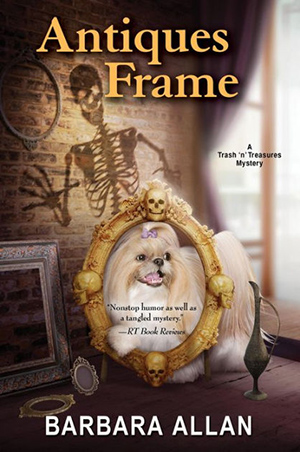People are always asking me what I read.
It’s one of the most common questions a writer gets, and I guess I understand it – apparently comes from a desire by a reader to get recommendations from someone whose work they like, and/or validation for books they like from that writer.
I disappoint people when I reveal how little I read of contemporary crime fiction. I’ve stated my reasons many times, but one reason I haven’t discussed much is the busman’s holiday aspect – not that, at the end of working day immersed in crime and mystery, I want nothing more to do with my genre of choice. Rather, that the writing process has worn out the same muscles that are used for reading.
So come evening, Barb and I watch plenty of crime and mystery TV and movies, although admittedly the movies tend to be older ones (like the books in the genre that I do read) and the TV tends to be British. I have a PAL friendly DVD player, and a Region B friendly Blu-ray player, letting me order discs from the UK all the time. We just watched the third season of Broadchurch, for example, and liked it very much. We also watched an excellent British series called The Forgotten, about very old, very cold cases. Also the fourth season of Endeavor and the third season of The Fall. We are looking forward (I’ve already ordered them) to seasons of Midsomer Murders, Murdoch Mysteries, the first season of Tennison, and the last season of Ripper Street.
So I’m very much still interested in the genre, although much of the American brand of TV mystery leaves me lukewarm to cold.
And much of my “reading” of mystery fiction these days is listening to audio books in the car. We have six-hour drives to St. Louis to see son Nate and his bride and our grandson, fairly frequently, and our day trips run to Chicago (four hours one-way) and Des Moines (three hours one-way). We listen to my own stuff – right now, Dan John Miller is doing a great job on Executive Order – and are happy to have Antiques Frame on audio to listen to next. We re-listen to Rex Stout novels and novellas for the umpteenth time, have been through all of Christie, and quite a few Simenon “Maigrets” (after watching the complete French/Belgian series starring Bruno Cremer – loved it).
What I do read, and it tends to be late at night, is a certain amount of non-fiction. Currently I’m reading Brian De Palma’s Split-Screen: A Life in Film by Douglas Keesey, and enjoying it. But I want to recommend a book that you have to go to some trouble to lay hands on.

Gun Crazy: The Origin of American Outlaw Cinema by Eddie Muller is available only here:
http://blackpoolproductions.com/guncrazyretail.html
No Amazon. I stumbled onto a bookstore that carries it (Mysterious Bookshop in NYC). It’s the first American edition of a French book that was available with a wonderful elaborate Blu-ray edition of Gun Crazy.
Muller should need no introduction – he’s the undeniable guru of film noir, the man behind the Noir City Festival and the Noir City Foundation, with its wonderful e-mail magazine and yearly annual. Not surprisingly info is available at www.noircity.com. He’s written acclaimed fiction and non-fiction in the noir vein, and he appears regularly on TCM, every Sunday morning, your time much better spent than watching the Sunday political shows or going to church.
His book on Gun Crazy is remarkable – it’s like reading a terrific Gold Medal paperback that happens to be true, digging into all of the history from my fellow Iowa author MacKinley Kantor to blacklisted screenwriter Dalton Trumbo, from the maniac King brothers to my favorite B-movie director, Joseph H. Lewis. The pictures are so great – photos, documents, script pages – that the book worked beautifully in French, which I can neither read nor speak. In English it’s sheer delight. Muller contends the auteur theory is crap, an opinion with which I don’t entirely agree, but he makes an excellent argument, using Gun Crazy – so often credited to Lewis more or less exclusively – as a case in point.
My history with Gun Crazy goes back to 1967. I saw Bonnie and Clyde before the fuss, and my life was changed – the fusion of true crime and the fiction genre I loved was taken to a whole new level. I was so in the thrall of Bonnie and Clyde that I read everything I could get my hands on about the real outlaw couple, even looking at old newspapers on microfilm (setting the stage for Nathan Heller research), and I set out to see every movie derived from their story.
That was no easy task in 1967. VCRs were almost a decade away, so I was left to the whim of late-night movies and a University of Iowa film series at the student union, where mostly kids came to laugh at old movies that they were so much smarter than. One by one I picked the movies off: The Bonnie Parker Story (1958), cheapjack sleaze (which is okay by me, generally); They Live by Night (1948), terrific movie directed by Nicholas Ray; You Only Live Once (1937), a Fritz Lang-directed film and another good one; and finally Gun Crazy (1950). As a kid, I’d seen a Naked City episode called “A Case Study of Two Savages” that had frightened and excited me, but had no idea Rip Torn and Tuesday Weld were doing Clyde and Bonnie. I caught up with it again a year or so ago and saw the connection, and wondered if it had inspired in any way the Arthur Penn 1967 Bonnie and Clyde.
It’s surprising that the outlaw couple had already generated very good Fritz Lang and Nick Ray movies (also not surprising that a cheapjack Roger Corman-produced film existed, as part of the drive-in movie cash-in on The Untouchables TV show). But what was astonishing about Gun Crazy (in addition to a thousand other things) was that it was better than Bonnie and Clyde. That after having my life changed by Bonnie and Clyde, Gun Crazy changed it all over again, more deeply, and became a movie on my very, very short list of favorites (regular readers here may recall the others: Vertigo, Kiss Me Deadly, Phantom of the Paradise). It’s a love story in the way the best James M. Cain novels are, and that’s high praise.
Eddie Muller’s book on Gun Crazy is so terrific, so entertaining, I had a reaction that I rarely have: Oh, good – I don’t have to write this book…somebody else has done it for me.
A local paper has published a nice little article about my Grand Master “Edgar” honor, here (look past the misspelled first name, will you?).
And here is Ellery Queen Mystery Magazine’s editor’s blog on the Edgar event, with a nice shout-out to me.
M.A.C.










